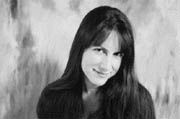
 |
 |
 |
Composition 101 |
|
"Get
up out of your chairs and stretch!"
These undergrads don't
know what to make of this strange guest lecturer from
the outside world who has, obviously mistakenly, been invited to
speak to them this afternoon about composing. So far, there doesn't
seem to be a whole lot of material about... composing... being presented.
"Everyone, up!" Too many hours on their butts in these hard seats. Too many classes listening blindly to professors 1, 2 and 3 tell them all sorts of things that they may or may not even absorb, depending on the weather patterns and their hormone levels that day. Blame it on the buzzing fluorescent lights and the stuffy close-windowed classroom, but I sensed something stagnant. Fresh thoughts, like air, need to circulate freely.
|
Human beings under the age of, say, thirty, are notorious for their lack of humor about themselves; bring something as potentially serious as art into the picture and watch out— a passerby might think we were at a funeral. "But music, of all things on this beautiful planet, is the most basic, fundamental, physical entity there is! You all know this— you can easily cite me the rules of acoustic physics, the overtone series, and lots more of that cool stuff. Those are real, physical truths; you've absorbed and accepted them. So how is it that we, as such informed humans, can sometimes become so removed from these natural sciences?" |
| "Music is sex. Passion! Love. Joy. Pain. Tears. Agony! More joy. Communication. Y'know, making music is a helluva lot like making love." |
|
|
Sudden
silence. I appear to have snagged their attention, for the moment. |
"The joy. The passion. The sheer delight and utter happiness we feel when we're in the midst of writing a new piece that's going well. The excitement and energy in a room when you hear your piece performed by wonderful players. These basic pleasures are what being a composer is about. It's a given that the real world of commerce— and that's a big, important gaseous planet which we'll visit later— can obscure the underlying reason we all got into this mess to begin with. Yes, you'll worry about getting awards, performances and good reviews. And you'll wonder where your next rent check will come from. Art and commerce have at once everything to do with each other, if you really want a successful music career, and they also have nothing to do with each other, if you intend to stay sane and focussed. Your job is to be able to distinguish between those pendulum swings, to know which is which and to hold on to your personal principles, regardless of the business dealings you're pursuing. I'm all for school and I advocate that you stay in college and get your degrees. But enduring this process means that you run the risk of losing sight of the primal, base reason you're driven to write music, and that's why I'm talking about these things with you so directly." |
| Yup.
Still nodding. I pushed forth. |
|
"Why
do you compose? Is it to unearth deep psychological angst and
pathos, is it a personal diary? Or do you put notes next to other
notes with the hope that someday someone will hear the results
of your labor and... gee... really like the piece? Do you write
to communicate with an imagined audience, or do you write to
communicate with your own soul, with no concern for others? I
pass no judgment either way—
far be it for me or anyone you know to tell you why to
compose. But I think that it's important for you, the perpetrator
of the crime, to know why you're
doing it. As they ask in acting class, "what's
your motivation?" |
"During a performance, everyone knows when that electricity is arcing, and that only increases the intensity of the moment. Communicating my visions and emotional experiences to others is a profound joy and challenge. This is why I get out of bed every day; the feeling that not only do I have something to say with my music, but I’ve been given the sense, from past positive experiences, that others are interested to hear what my music has to say, too. And when the elements align just right, it is indeed magic. Each of you can have those same experiences, and you should each feel worthy of them. They are yours to create."
The room has become very quiet.
"Like love, and passion. You find them, or perhaps they find you. But when they’re for real, they don’t come from here (I point hard to my skull), they come from here (as I brace my hand against my sternum). And that truth is electric. You don’t make love to someone from your intellect and cleverness. You adore and connect with them from your heart. Everyone can tell the difference; it's not something we can fake. Your music at its best will always come from that same honest place. And you will always posses the ability to summon it in your mind, if you simply take a moment to connect with your body and your spirit. It's permanently inside of you, just waiting for an opportunity to come out." |
|
A
few small light bulbs lit up over some of the students' heads.
I swear I saw them, glowing brighter than those buzzing fluorescents.
The young composers were given validation for their music and for
their desire, and with a little luck, those bulbs stayed lit through
the night which followed, and for many days and nights thereafter.
It was a privilege to be able to communicate to these future colleagues the
joy that I feel about a life in music. And by telling them, I reminded
myself.
|
 |
 |
 |
 |
 |
|
Four Letter Words from a Maestro |
|
The
renowned conductor Erich Leinsdorf was giving a master class to
a handful of students at The Aspen Music School, and for some lucky
reason I happened to be among them. An intimate group in a semi
circle, we sat outside under the trees with the Rocky mountains
as backdrop to the scores of various Beethoven symphonies that
the Maestro presented and discussed with us. It was an
extraordinary opportunity for this eager 16 year old composer. Although I must admit that over twenty five years later, I don't recall the pith of his musical analysis that day, what I distinctly remember is even more valuable. There was a moment in which Mr. Leinsdorf put down the heavy scores and looked directly at each of our young faces and proclaimed (and I paraphrase): "If you are planning on pursuing a professional career as a musician, you must know with every fiber in your body that this is what you must do and that you believe that you are the best at it. Sometimes we act as though such an arrogant term— best— is a four letter word. But there are too many dilettantes with failed careers out there; if you are going to follow this path, then you must know in your heart that you are undeniably compelled to do so and that you are very, very good at what you do. Otherwise, stop now." |
He was absolutely, brutally, correct. Step one: Be passionate about the work and the pursuit of it. Step two: truly believe that you are worthy of success. If you do not inherently and deeply believe this, then you are setting yourself up for failure, because if you do not have this faith in yourself, how can you possibly project your assets to others? I thank Mr. Leinsdorf for speaking so honestly, and for teaching me about self assessment and truth, neither of which are four letter words. ©2008 Alex Shapiro |
Want some more? Along with photos and music? For ten years beginning in 2006, Alex published a personal, pixelsonic blog called Notes from the Kelp, that has developed a following of thousands of readers each month. She pairs snapshots from her daily life by the sea with audio clips of fitting pieces of her music, and welcomes comments. It's Alex's contribution to virtual tourism! Join her in Kelpville, and see where her music really comes from. Enter another world, here
|
Click for more essays on: |
 |
||

©2000-2025 by Alex Shapiro. All rights reserved to design and content.

